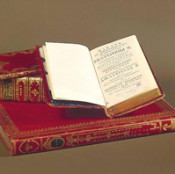
Catherine the Great’s “Instructions” to the Legislative Commission issued
On July 30 (August 10) in 1767 the Legislative Commission started its work in Moscow and was presented with Catherine the Great’s “Instructions” (Russian: Nakaz) — philosophical and legal treatise, which embodied views of the Empress on the future legislation and government of Russia. On this very day “Instructions” was issued as a guidance to the Commission’s deputies responsible for creation of a new Law Code which was to displace the “Law Code of 1649” (Russian: Sobornoye Ulozheniye). For the first time in the history of Russia principles of legal policy and legal system were formulated in the “Instructions”.
In 1764-1765 the Empress, guided by ideas and recommendations of enlightenment thinkers, was working on “Instructions”. It was based on a famous treatise of the French thinker Baron de Montesquieu “The Spirit of the Laws” and the work of an Italian criminalist Cesare Beccaria “An Essay on Crimes and Punishments”, which was popular at that time. The “Instructions” of Catherine II included 22 chapters and 655 articles, an introduction, a conclusion and two supplements, and was dedicated to the state, civil and criminal law and court.
“Instructions” highlighted the necessity of a strong autocratic power, “… as no other power on such a territory could exist and would be not only harmful, but even ruinous for citizens”, and stipulated equality of citizens before the law and their “freedom” within the limits of law. Control organs between people and supreme power, operating on the basis of law, were to guarantee prevention of autocracy growing into tyranny. “Instructions” abolished torture, limited capital punishment and proposed to divide judicial power from executive.
“Instructions” was many times edited by the Empress herself, especially the part dealing with peasants and where records of serfdom limitation were deleted. However at the session of the Legislative Commission for the Law Code some deputies criticized serfdom rules and came up with proposals of serfdom limitation, transference of part of land into the ownership of peasants, on restrictions of services and even withdrawal of peasants from the power of landowners. This all provoked a storm of criticism on the part of landowners.
As a result members of the Commission appeared to be not ready to adopt principles, represented in “Instructions”. Under the pretext of the beginning of war with Turkey the general session of the Commission was closed in January 1769. The Legislative Commission was officially dissolved by the Empress in December 1774.
A century later an outstanding Russian historian V. O. Kluchevsky wrote about Catherine II’s “Instructions”: “Despite objections and abridgements, Catherine was very satisfied with her work being her political confession. Even before it was published she wrote that there she told everything, emptied her bag and in course of her life would not say a word, and everyone who saw her work unanimously took it as the acme of perfection...”.
Lit.: Иванов П. В. К вопросу о социально-политической направленности «Наказа» Екатерины II // Учёные записки Курского педагогического института. 1954. № 3; Дитятин И. И. Екатерининская комиссия 1767 г. «О сочинении проекта нового уложения». Ростов-на-Дону, 1905; Зотов В. Д. Императрица Екатерина и её «Наказ» // Вестник Российского университета дружбы народов. Сер.: Политология. 2000. № 2. С. 21-32; Ключевский В. О. Происхождение, составление и источники Наказа. Цензура и критика Наказа. Содержание Наказа. Мысль Наказа // Курс русской истории. Лекция 77. М., 1990; Тарановский Ф. В. Политическая доктрина в Наказе императрицы Екатерины II // Сб. статей по истории права, посвящённый М. Ф. Владимирскому-Буданову. Киев, 1904.
Based on the Presidential Library’s materials:

